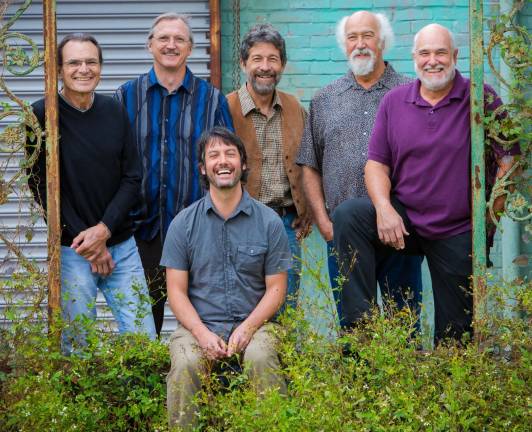Cajun music innovators coming to Newton

NEWTON — The Newton Theatre welcomes back Cajun music innovators BeauSoleil avec Michael Doucet on Friday, July 28, 2017, at 8 p.m. Tickets will go on sale to the general public on Friday, May 14th at 10 a.m.
Tickets for BeauSoleil range from $19 to $34 and may be purchased by visiting www.thenewtontheatre.com or contacting the Box Office at 973-383-3700.
BeauSoleil avec Michael Doucet has been making some of the most potent and popular Cajun music on the planet. Born out of the rich Acadian ancestry of its members, and created and driven by bandleader Michael Doucet's spellbinding fiddle playing and soulful vocals, BeauSoleil is notorious for bringing even the most staid audience to its feet.
BeauSoleil avec Michael Doucet have kept their musical flame alive for forty years in shaping and reinventing this treasured American art form. Since 1975, Grammy-Award winners BeauSoleil have claimed their undisputed role as the most esteemed Cajun group in music. They take the rich Cajun traditions of Louisiana and artfully blend elements of zydeco, New Orleans jazz, Tex-Mex, country, blues and more into a satisfying musical recipe. The music of BeauSoleil continues to captivate audiences the world over.
Since becoming the first Cajun band to win a Grammy Award (Traditional Folk Album 1998) and then a second Grammy in 2010, BeauSoleil has garnered many accolades, including twelve Grammy Award nominations. They are regular guests on Garrison Keillor's National Public Radio show A Prairie Home Companion, where Keillor has dubbed them as 'the best Cajun band in the world,' and their music is so integral to the Cajun culture that they have been featured on the New Orleans' based hit HBO program Treme.
Their presentation of newness and reverence of tradition is the heart of the band. 'People know Cajun music being from Southwest Louisiana but it has influences form all over: Nova Scotia, France, delta blues, the islands, and the traditional improvisational aspects of New Orleans. We're always pushing that envelope,' comments Doucet, 'All the songs are different ' there aren't two songs that sound remotely alike though they are played with the same set of instruments. That comes from these rebellious hearts that we always had. We've always taken chances. To attempt to create great music of any kind, one has to take chances.'
Though fascinated by music of all kinds, Michael Doucet is defined by his deep connection with, and dedication to, the music of the sacred French-Cajun culture. A Folk Arts Apprenticeship from the National Endowment of the Arts spurred Doucet to seek out every surviving Cajun musician and learn from them in person; he studied genre fathers Dewey Balfa, Dennis McGee, Sady Courville, Luderin Darbone, Varise Connor, Canaray Fontenot and many others, even inspiring some to return to publicly performing. In 2005 the National Endowment of the Arts recognized Doucet's integral involvement with the Cajun world, awarding him the esteemed National Heritage Fellowship as well as the United States Artists Fellowship in 2007.
Doucet has gained acclaim by developing his own flavor of Cajun music, representing many 'firsts' for the genre. Early on they focused on the lead and twin fiddle styles of the originals of Acadian folk music over the more popular 1920s adoption of the German diatonic accordion. They performed with the communal integrity characteristic of early Cajun music, choosing to perform unplugged. They broke ground as the first band to feature an acoustic guitar as the lead instrument, replacing the lead accordion or steel guitar. They were the first to include the frottoir, the rub board borrowed from Cajun music's Zydeco cousin, and they were the first to feature a female vocalist. All of these innovations were fueled by Doucet's determination to rejuvenate Cajun and zydeco music, breathing into it a new relevance.
Indeed the band has achieved that goal and more, furthering the legacy and understanding of this unique American sub culture, performing in every state of the Union and in 33 countries. 'When we first started, we were fortunate to have these great master musicians like Dennis McGee still living. We were able to play with them and hang out with them. Some of them were born before 1900. Now we're the elders and that's scary, as you can imagine,' reflects Doucet, 'However we're pretty proud of the voice that we've produced on this record as far as the watermark. You do what you feel and what you believe in. We pushed the envelope just for the hell of it and that's just who we are. And you can dance to it at the same time.'